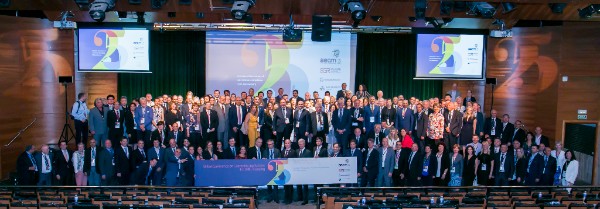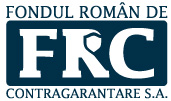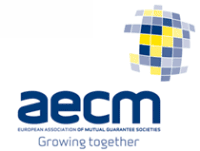Adunarea Generală si Conferinta anuala AECM – Asociatia Europeana a Institutiilor de Garantare/Contragarantare – Madrid, iunie 2017
01.06.2017

AECM 2016 - A YEAR OF LOBBYING
POLITICAL REPRESENTATION
The creation of more favorable financing conditions for micro, small and medium-sized enterprises (MSME) kept on being a particular concern of AECM and its members who facilitate MSME’s access to finance, thereby making it possible that innovative and fast growing projects are realized which otherwise would not be the case.
THE STUDY PROJECT
One of the major activities to this extent was the elaboration of a study on the “Importance of financial intermediaries in SME financing and assessment of different economic effects especially of EU financial instruments in the light of direct guarantee vs. counter-guarantee contracts” undertaken by KPMG Rome.
KPMG concluded i. a. that counter-guarantees, which means that guarantee institutions are involved in the distribution chain as financial intermediaries, should be provided on better terms than it has been the case up to now. The main reasons are that first of all counter-guarantees have higher positive macroeconomic effects on innovation, growth and employment because contrary to commercial banks, national and regional guarantee institutions have a clear focus on these economically relevant projects. Moreover, the granting of counter-guarantees creates greater efficiency of the use of public money because of a higher leverage effect which is achieved with counter-guarantees since next to the EU resources in form of the counter-guarantee also national funding is used. Another important advantage of counter-guarantees consists in the fact that all MSME have access to the support of financial intermediaries who act in neutral way on a regional or national level.
Whereas the study remains an internal document being accessible for AECM’s members only, KPMG’s policy recommendations to strive for greater complementarities and synergies between existing instruments and players, to increase the efficiency in the use of public money by involving guarantee institutions in the lending chain, to increase the data available in this area and, as stated above, to offer counter-guarantees at more convenient conditions as compared to direct guarantees are being integrated into the daily lobbying work of AECM.
EUROPEAN FUND FOR STRATEGIC INVESTMENT (EFSI)
Another central area of activity for AECM kept on being the European Fund for Strategic Investment (EFSI), the core of the Investment Plan for Europe. To recall this Plan was adopted in November 2014 to address the low levels of investment in the EU which resulted from the global economic and financial crisis. AECM warmly welcomes that its request to use the counter-guarantee instrument under EFSI to stimulate the economy was successfully met. More precisely, under the SME window of EFSI, additional funding was provided for the COSME Loan Guarantee Facility as well as for the InnovFin SME Guarantee Facility.
Accordingly, AECM’s members have been taken up well this great opportunity: 16 members coming from 13 EU Member States signed contracts under EFSI enabling them to promote even more MSME and further members are interested in following. Thus, guarantee institutions are contributing decisively to the implementation of EFSI and to achieving the objectives pursued with EFSI, i.e. to create jobs and growth.
EU FINANCIAL INSTRUMENTS
The use of these counter-guarantee instruments has been developing so successfully that AECM keeps on advocating for an adequate budget allocation for the EU guarantee instruments in order to avoid that the money is running out. For this reason, we greatly appreciated that on 26 July 2016 the European Commission and the EIB Group complied with AECM’s request by agreeing to shift 500 million euro from the infrastructure and innovation window to the SME window. Moreover, we were delighted that our demand for sufficient funding was taken up again by the European Commission proposing on 14 September 2016 to extend EFSI by increasing the financial means allocated to the SME window from 5.5 billion euro to 10.5 billion euro. During the legislative procedure AECM strongly defended its cause especially vis-à-vis the European Parliament but also towards the Council of the European Union to ensure the allocation of adequate funding to the guarantee instruments of the SME window. AECM’s members are determined to go on fulfilling their decisive function in implementing EU financial instruments which they have thanks to having a profound knowledge of the market, covering a whole region or country, ensuring the optimal use of public resources via risk-sharing and being free of profit-oriented interests. Thus, this topic remains key for AECM also in 2017 and most likely beyond.
It goes without saying that like in the past AECM’s members continuously obtained information about the EU financial instruments and the role that EFSI is playing. This happened also as usual on the occasion of several events that AECM organized giving its members the opportunity to discuss with external experts and to receive first-hand information but also to exchange the respective experiences gained among themselves. To mention just one example: on 08 March 2016 AECM and the European Investment Fund (EIF) organized jointly a workshop on the EU financial instruments in Luxembourg. During this workshop, the excellent cooperation between the EIF and AECM’s members under EU programs as well as the important role that AECM’s members are playing in the implementation of EFSI and the different types of EU guarantee instruments were highlighted next to the presentation of best practice examples from AECM’s members causing inspiring discussions.
AGRICULTURE
In the area of agriculture, the close interaction between AECM and the Directorate General Agriculture and Rural Development (DG AGRI) of the European Commission went on.
AECM and its members received again the opportunity to nominate one or often several speakers at the EAFRD-specific events under fi-compass, a platform for advisory services on financial instruments under the European Structural and Investment Funds (ESIF) and microfinance under the Programme for Employment and Social Innovation (EaSI). fi-compass is designed to support ESIF managing authorities, EaSI microfinance providers and other interested parties, by providing practical know-how and learning tools on financial instruments. Hence, AECM felt privileged for having received speaking slots for AECM and for its members at the conference on 31 May 2016 on the EAFRD financial instruments for agriculture and rural development in 2014-2020 which took place in Madrid, Spain, at the conference on 13 June 2016 on the EAFRD financial instruments for agriculture and rural development in 2014-2020 which was organised in Rome, Italy, at the macro-regional conference on 24 October 2016 on EAFRD financial instruments for agriculture and rural development in 2014-2020 happening in Warsaw, Poland and at the second EU fi-compass conference on 25 November 2016 on EAFRD financial instruments for agriculture and rural development in 2014-2020 organised in Brussels, Belgium. These events provided a great opportunity to present the important positive impact of the guarantee instrument likewise for agriculture.
Furthermore, AECM appreciated a lot DG AGRI’s support in solving the question if COSME funding can be combined with EAFRD resources. This topic has become relevant for more and more members of AECM who start using the COSME Loan Guarantee Facility for the agricultural sector (e.g. AVHGA / Hungary, the guarantee banks in Germany, SIAGI / France…). This is also due to the successful and intense exchange of information and experiences among AECM and its members as well as among the members themselves.
Upon AECM’s request to DG AGRI in summer 2016, AECM received the reply that DG AGRI had internal discussions with its legal unit in relation to the question that AECM asked, i.e. on the combination of EAFRD and COSME resources and the interpretation of Article 59(8) of R 1305/2013 as well as of Article 65 (11) of the CPR. AECM was happy to learn that according to DG AGRI a combination is possible. Yet, this interpretation was not shared by Germany so that the German guarantee banks had to put on hold requests for their guarantees being counter-guaranteed by the COSME Loan Guarantee Facility when grants of the EAFRD are involved as well. Thus, AECM got back to DG AGRI kindly requesting a water-proofed interpretation of the relevant legislation. Consequently, AECM keeps this topic on the agenda which is essential for the realisation of many agricultural projects in several Member States.
Next to the excellent collaboration with DG AGRI also the one with the OECD developed well: following a project to define a Credit Guarantee Scheme for Agribusiness SMEs in Ukraine, the OECD got back to AECM with the suggestion for a cooperation as to a project in Kazakhstan on the topic of access to finance, and in particular on exploring the options of supporting the development of a credit guarantee scheme in agriculture. Accordingly, AECM was lucky to be able to involve several experts in this project.
BANKING SUPERVISION
Like in previous years also in 2016 AECM raised its voice on behalf of its members in the field of banking supervision.
Accordingly, AECM participated in public consultations and submitted comments on the European Central Bank consultation on the collection of granular credit and credit risk data (“AnaCredit”) - http://aecm.eu/wp-content/uploads/2016/05/AECM-comments-AnaCredit-consultation-2016-01-29.pdf as well as on the Basel Committee on Banking Supervision’s Second consultative document “Revisions to the Standardised Approach for credit risk” - http://aecm.eu/wp-content/uploads/2016/05/2016-03-11-consultation-standardised-approach-for-credit-risk-comments-of-AECM.pdf.
As only association AECM achieved to nominate a speaker at the Seminar on Synthetic Securitisation and Financial Guarantees which was organised by the European Banking Authority (EBA) and the European Investment Bank Group in London on 31 May 2016 and during which the opportunities and challenges on the role and potential use of credit guarantees and synthetic securitisation in the banking sector were discussed. It was attended by representatives from national supervisors, from the European Central Bank (ECB), from the European Commission and from banking representatives - http://www.eib.org/infocentre/events/all/seminar-on-synthetic-securitisation-and-financial-guarantees.htm .
On 23 November 2016, the European Commission published its banking package of reforms to further strengthen the resilience of EU banks. This package comprises to complete the post-crisis regulatory agenda by making sure that the regulatory framework addresses any outstanding challenges to financial stability, while ensuring that banks can continue to support the real economy. The proposals amend the
Capital Requirements Regulation (CRR) and the Capital Requirements Directive (CRD) which were adopted in 2013 and which set out prudential requirements for credit institutions (i.e. banks) and investment firms and rules on governance and supervision; and these proposals amend as well the Bank Recovery and Resolution Directive (BRRD) and the Single Resolution Mechanism Regulation (SRMR) which were adopted in 2014 and which spell out the rules on the recovery and resolution of failing institutions and establish the Single Resolution Mechanism. With these measures, international standards shall be implemented into EU law, while taking into account European specificities and avoiding undue impact on the financing of the real economy. They also take into account the results of the Call for Evidence in which AECM took also part - http://aecm.eu/wp-content/uploads/2015/10/AECM-contribution-EBA-.pdf .
In the course of the corresponding discussions AECM demands relief for SME lending most importantly to keep the SME support factor unchanged and to introduce more proportionality, i.e. calling for a “small and simple banking box” which provides for fewer and simpler rules for small, low risk credit institutions. More precisely AECM is in favor of applying the criteria of the European Banking Authority (EBA) for defining the “small and simple banking box”: Institutions which, according to the EBA criteria, are not considered systemically relevant or otherwise systemically important should be included in the “small and simple box”. The revision of CRD and CRR should be used to reduce reporting obligations and to dispense with a general disclosure obligation in the “small and simple banking box”.
THE EU BUDGET
AECM took also part in the Public consultation on the revision of the Financial Regulation. Thus, AECM submitted its views on the revision of the financial rules applicable to the EU budget. These rules concern financial instruments like, for instance, guarantees, the creation of a single rule book or the convergence of rules for various types of expenditure (e.g. grants and financial instruments) among others and are therefore of utmost importance to AECM’s members. AECM and its members fully support the objectives pursued with this revision, i.e. a simpler regulatory and financial set up, additional synergies and flexibility for budget implementation and a clear accountability framework which are in line with the practical experience gained by AECM’s members in using financial instruments. Yet, by means of some examples AECM illustrates in its position paper that there is room to simplify the regulatory and financial architecture - http://aecm.eu/wp-content/uploads/2016/12/AECMs-comments-Revision_Financial_Regulation_May-2016.pdf .
SME POLICY
Regarding SME policy in general, AECM paid particular attention to the drafting of the European SME-Action Programme (SMEAP). The SMEAP is an initiative of the SME-Envoy Network, a unique European network of SME policy makers and SME representatives. The SMEAP is meant to supplement the Small Business Act (SBA) as a working document. To recall: the SBA is the cornerstone of today’s European SME policy. Together with an update realized in 2011, it sets objectives and gives guidance to policy makers on both, European and national level. Based on the SBA considerable progress in European SME policy has been made. The SMEAP takes stock of the current situation of SMEs in Europe and analysis the main challenges they are facing. One of the topics covered is access to finance as to which AECM has been in constructive dialogue with the responsible persons of the network.
STATE AID
On 19 May 2016, the European Commission published the Commission Notice on the notion of State aid (cf. http://ec.europa.eu/competition/state_aid/modernisation/notice_of_aid_en.pdf ). The objective of this communication consists in providing guidance on when public spending falls within and outside the scope of EU State aid control. In other words, by means of this communication help should be given to identify when public support measures can be granted without needing approval under EU State aid rules. Following the public consultation in 2014 in which AECM took part (cf. http://aecm.eu/wp-content/uploads/2015/10/2014-03-14-AECM-position-on-notion-of-state-aid.pdf ), AECM stayed in touch with the European Commission following closely the developments.
In spring 2016, AECM undertook a survey among its members on state aid in order to gather information as to the question how the new state aid frame influences the situation in the countries. The outcomes were presented in the context of AECM’s General Assembly in Porto on 22 June 2016 during which also Barbara Cattrysse, State aid expert at the Legal Department of the European Investment Bank (EIB) intervened.
In autumn 2016, ahead of a meeting of AECM’s members VDB / Germany and aws / Austria with a representative of the Directorate-General Competition (DG COMP) of the European Commission, AECM’s members received the opportunity to submit questions they were having in the area of state aid and which they wanted to be submitted to the Commission official. A compilation of all the questions received were later on also sent to DG COMP which provided the answers a few weeks later. AECM highly appreciates this fruitful exchange.
THE PRINCIPLES FOR PUBLIC CREDIT GUARANTEE SCHEMES (CGS) FOR SMES
In 2015, the elaboration of Principles for Public Credit Guarantee Schemes (CGS) for SMEs by a Task Force of the World Bank Group and FIRST, a multidonor grant facility providing short- to medium-term technical assistance to promote sounder, more efficient and inclusive financial systems, was finalized. Members of this small expert group were amongst others José Fernando Figueiredo, Special Honorary President of AECM, and Pablo Pombo, Founding President of AECM.
Even though subsequently these principles have been increasingly becoming a global benchmark for the design, implementation and evaluation of public credit guarantee schemes, it turned out that some aspects of these principles required further study. Accordingly, AECM was requested to participate in the reconvened Task Force with the specific objective to explore the “Additionality Assessment Framework for Public Credit Guarantee Schemes for Small and Medium Enterprises”. AECM is delighted that its Special Honorary Chairman José Fernando Figueiredo is member of this Task Force being supported by Jean-Louis Leloir, Special Advisor to AECM’s Board of Directors. In addition, AECM’s Founding President Pablo Pombo is also a member of this Task Force yet, as before, in his function as Secretary General of REGAR, the Ibero-American Guarantee Network (cf. also http://www.worldbank.org/en/topic/financialsector/publication/principles-for-public-credit-guarantee-schemes-cgss-for-smes ).
Vizualizare raport AECM 2016 integral
<<
Inapoi la Evenimente











